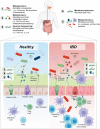Stool multi-omics for the study of host-microbe interactions in inflammatory bowel disease
- PMID: 36503356
- PMCID: PMC9746627
- DOI: 10.1080/19490976.2022.2154092
Stool multi-omics for the study of host-microbe interactions in inflammatory bowel disease
Abstract
Inflammatory Bowel Disease (IBD) is a chronic immune-mediated inflammatory disease of the gastrointestinal tract that is a growing public burden. Gut microbes and their interactions with hosts play a crucial role in disease pathogenesis and progression. These interactions are complex, spanning multiple physiological systems and data types, making comprehensive disease assessment difficult, and often overwhelming single-omic capabilities. Stool-based multi-omics is a promising approach for characterizing host-gut microbiome interactions using deep integration of technologies such as 16S rRNA sequencing, shotgun metagenomics, meta-transcriptomics, metabolomics, and metaproteomics. The wealth of information generated through multi-omic studies is poised to usher in advancements in IBD research and precision medicine. This review highlights historical and recent findings from stool-based muti-omic studies that have contributed to unraveling IBD's complexity. Finally, we discuss common pitfalls, issues, and limitations, and how future pipelines should address them to standardize multi-omics in IBD research and beyond.
Keywords: Inflammatory bowel disease (IBD); Multi-omics; diet; gut microbes; metabolomics; metagenomics; metaproteomics; precision medicine.
Conflict of interest statement
No potential conflict of interest was reported by the author(s).
Figures

References
-
- Papamichael K, Gils A, Rutgeerts P, Levesque BG, Vermeire S, Sandborn WJ, Vande Casteele N. Role for therapeutic drug monitoring during induction therapy with TNF antagonists in IBD: evolution in the definition and management of primary nonresponse. Inflamm Bowel Dis [Internet]. 2015;21(1):182–197. Available from: http://www.ncbi.nlm.nih.gov/pubmed/25222660 - PubMed
-
- Lakatos P-L, Lakatos L. Risk for colorectal cancer in ulcerative colitis: changes, causes and management strategies. World J Gastroenterol [Internet]. 2008;14(25):3937–3947. Available from: http://www.ncbi.nlm.nih.gov/pubmed/18609676 - PMC - PubMed
-
- Park KT, Ehrlich OG, Allen JI, Meadows P, Szigethy EM, Henrichsen K, Kim SC, Lawton RC, Murphy SM, Regueiro M, et al. The cost of inflammatory bowel disease: an initiative from the crohn’s & colitis foundation. Inflamm Bowel Dis [Internet]. 2020;26(1):1–10. Available from: http://www.ncbi.nlm.nih.gov/pubmed/31112238 - PMC - PubMed
